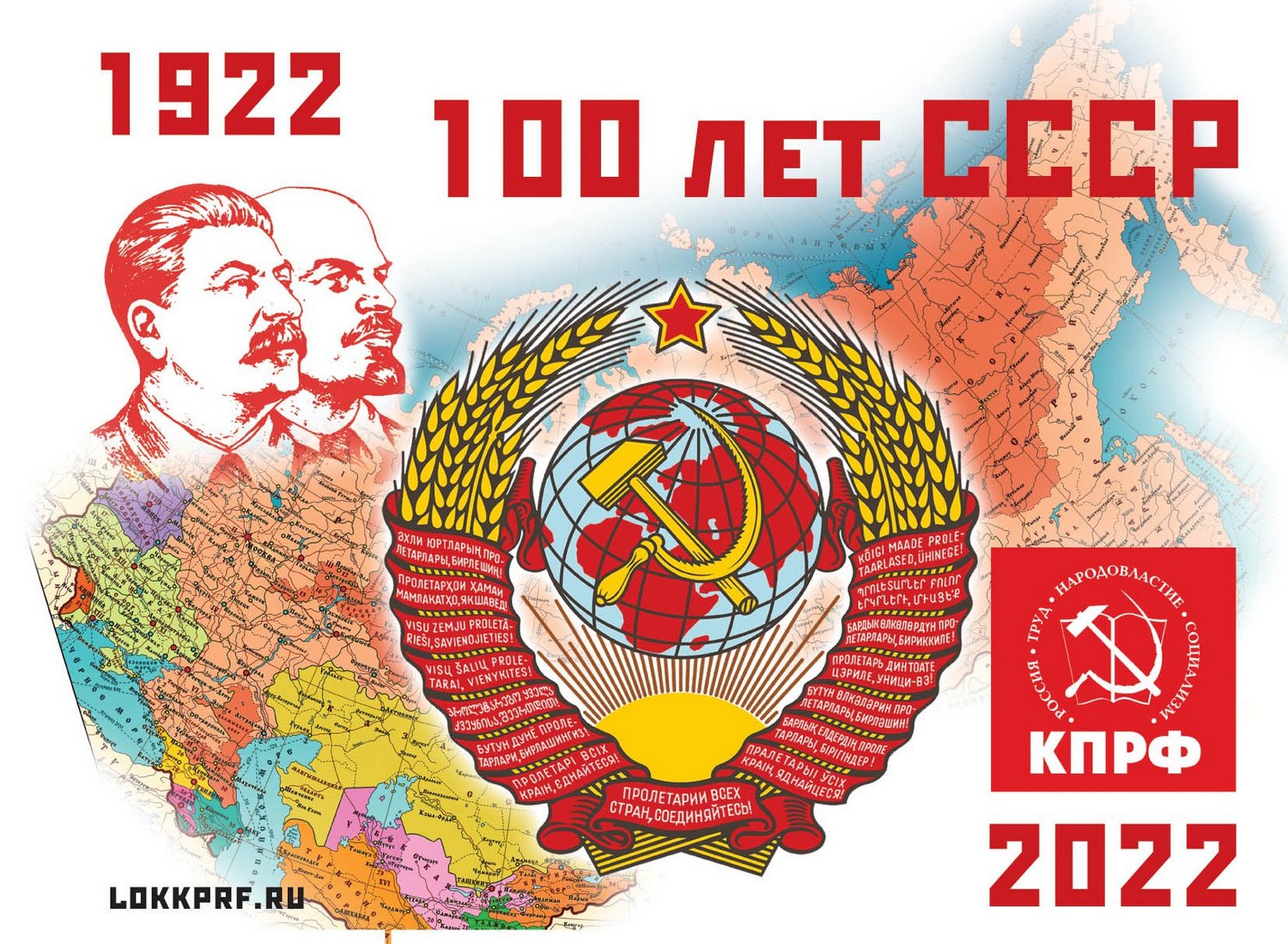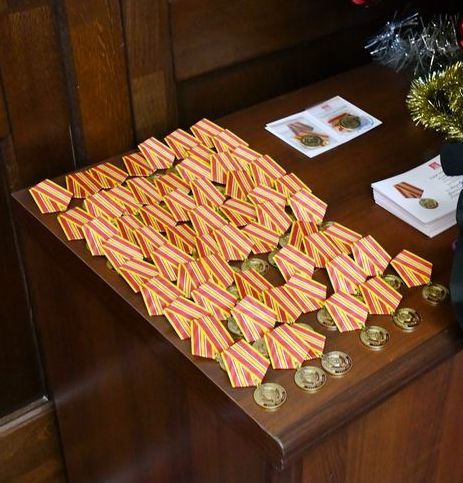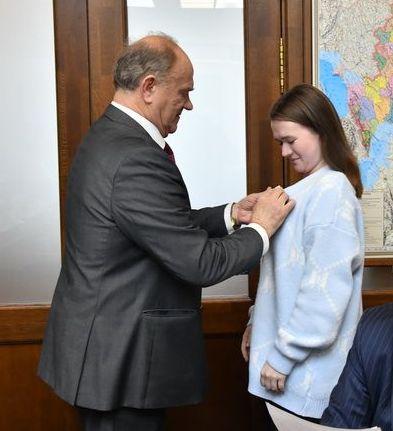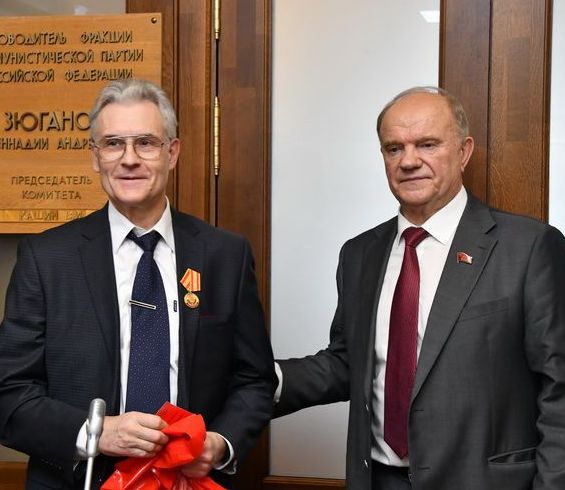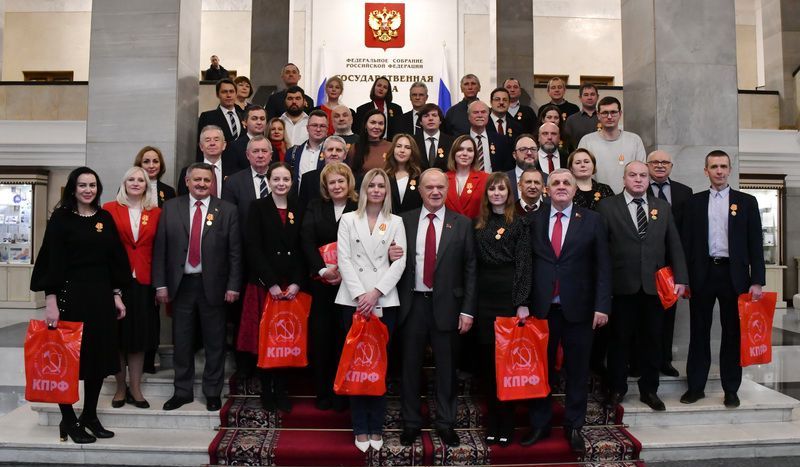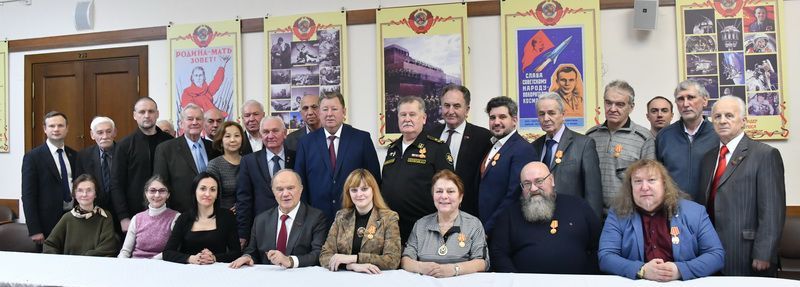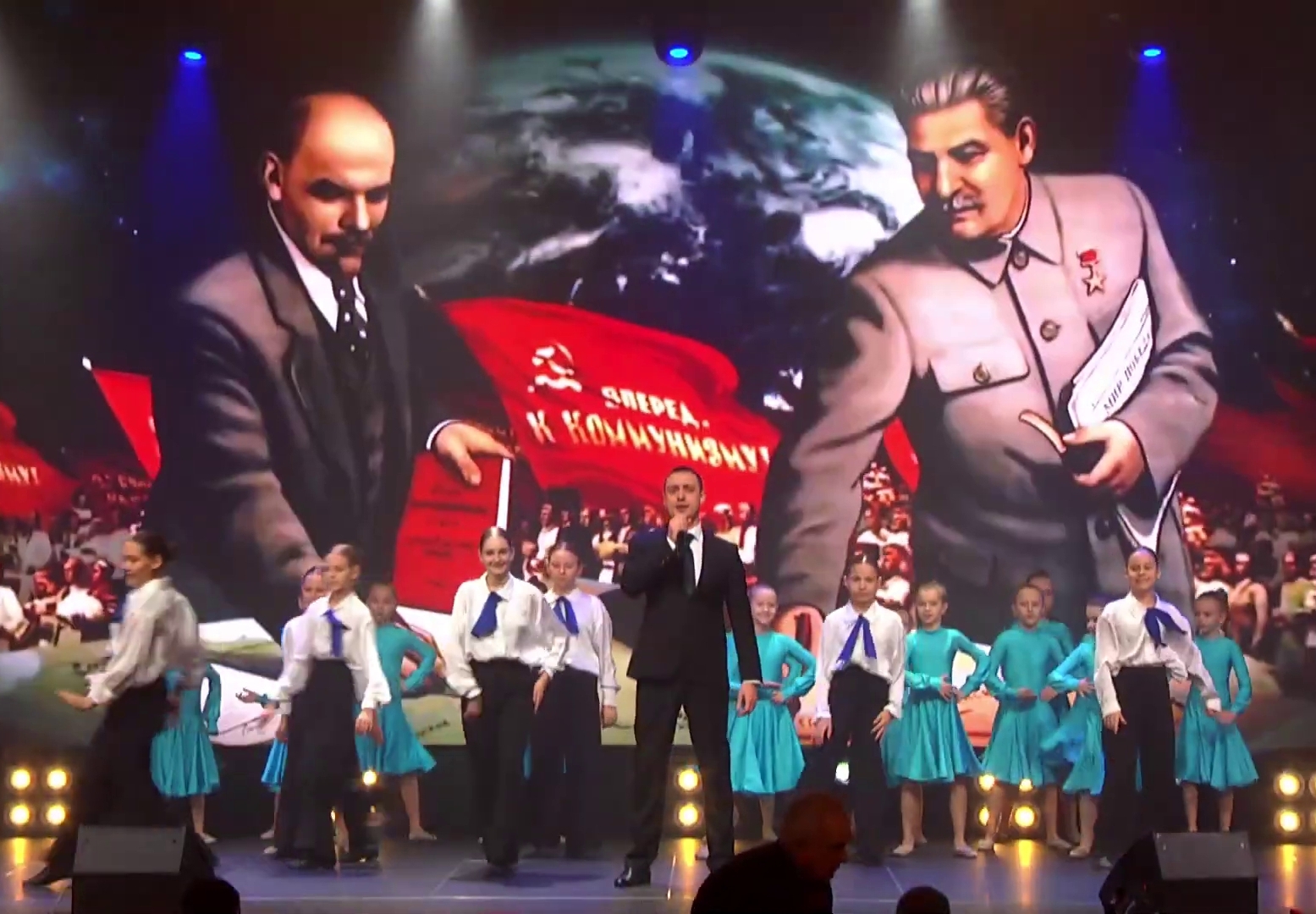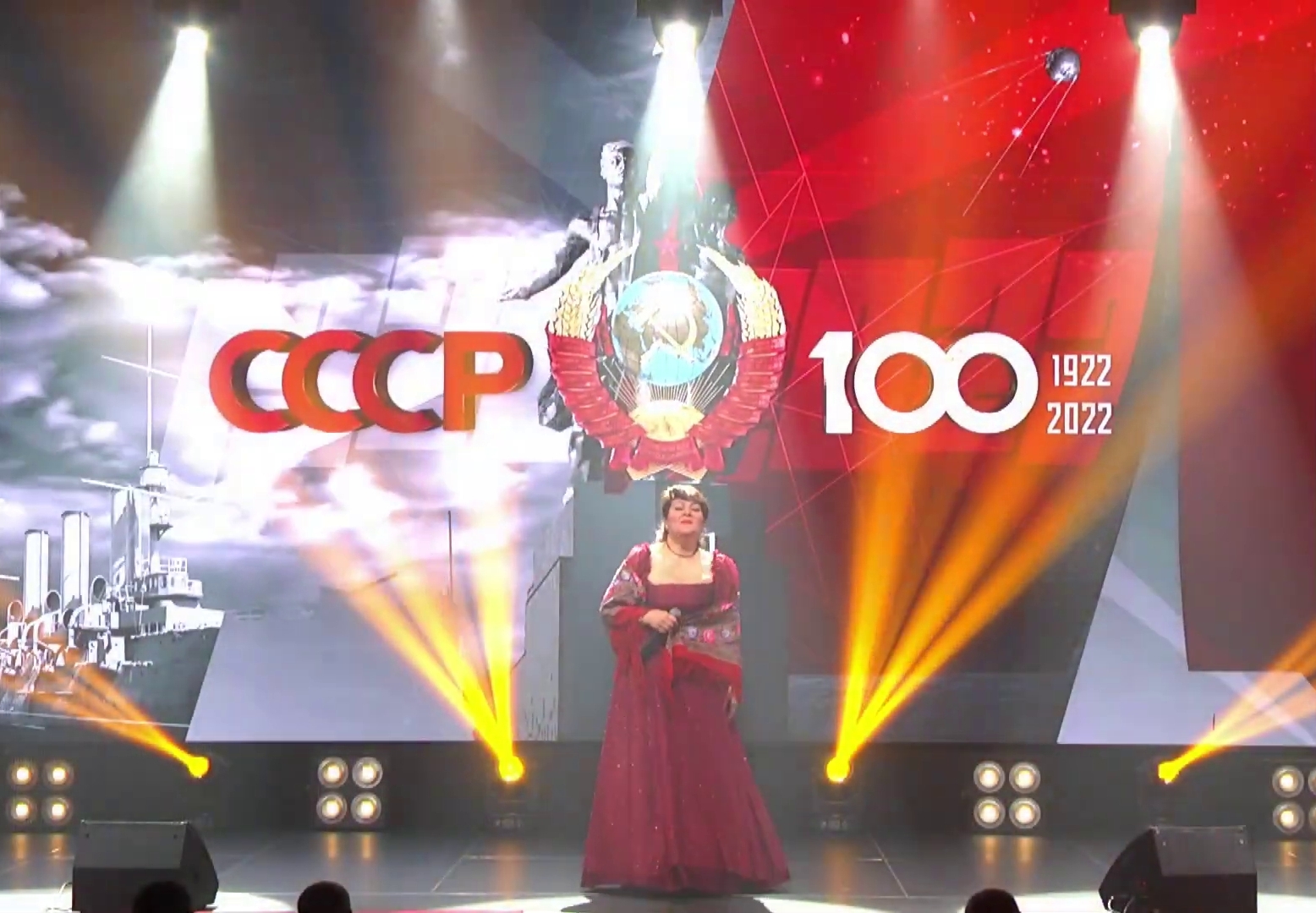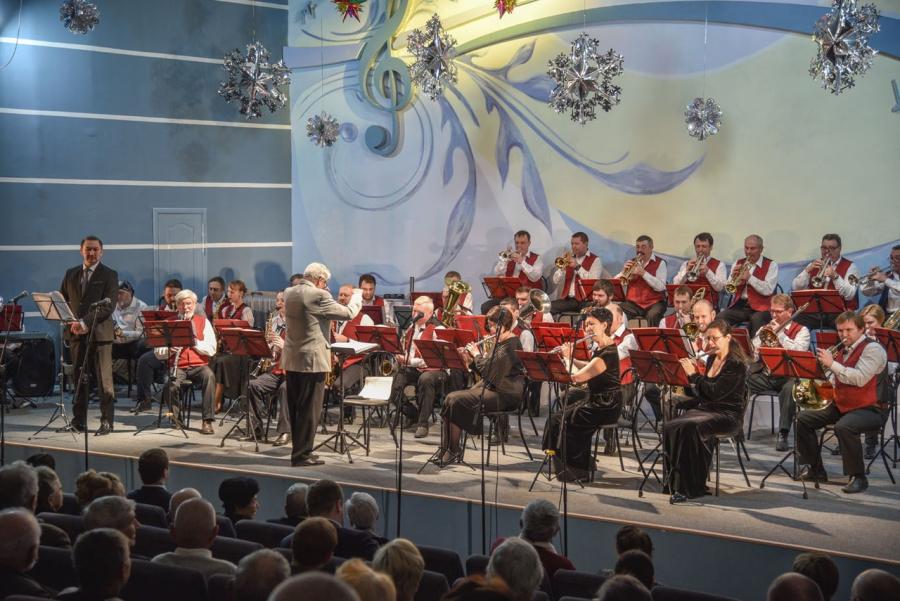December 30, 2022 - No. 64
100th Anniversary of the Establishment of the
Union
of Soviet Socialist Republics (USSR)
A Great Victory for Socialist Revolution and Socialist Construction
• The Formation of the Union of the Soviet Republics
• Greetings to the Land of Heroes!
• Tributes in Russia to Founding of Soviet Union
Video
• 1922 -- The Birth of the New
100th Anniversary of the Establishment of the
Union of Soviet Socialist Republics (USSR)
A Great Victory for Socialist Revolution and Socialist Construction
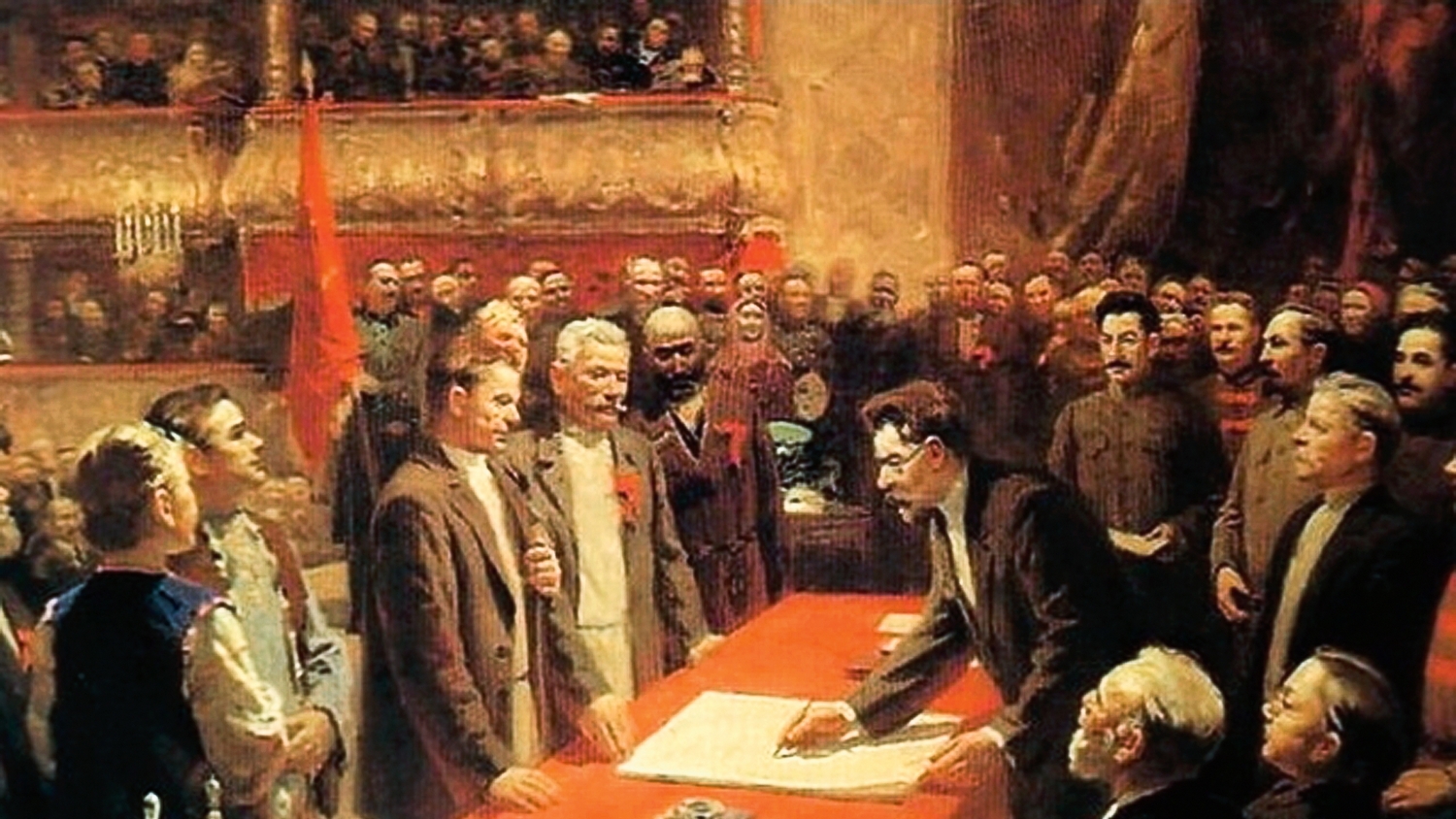
Signing of the Declaration and Treaty on the Creation of the Soviet Union at the
First Congress of Soviets of the USSR.
Today we celebrate the 100th anniversary of the establishment of the Union of Soviet Socialist Republics (USSR). It was a great victory for socialist revolution and socialist construction. To this day, the example set of the state constituted on the revolutionary basis heralds the birth of the New.
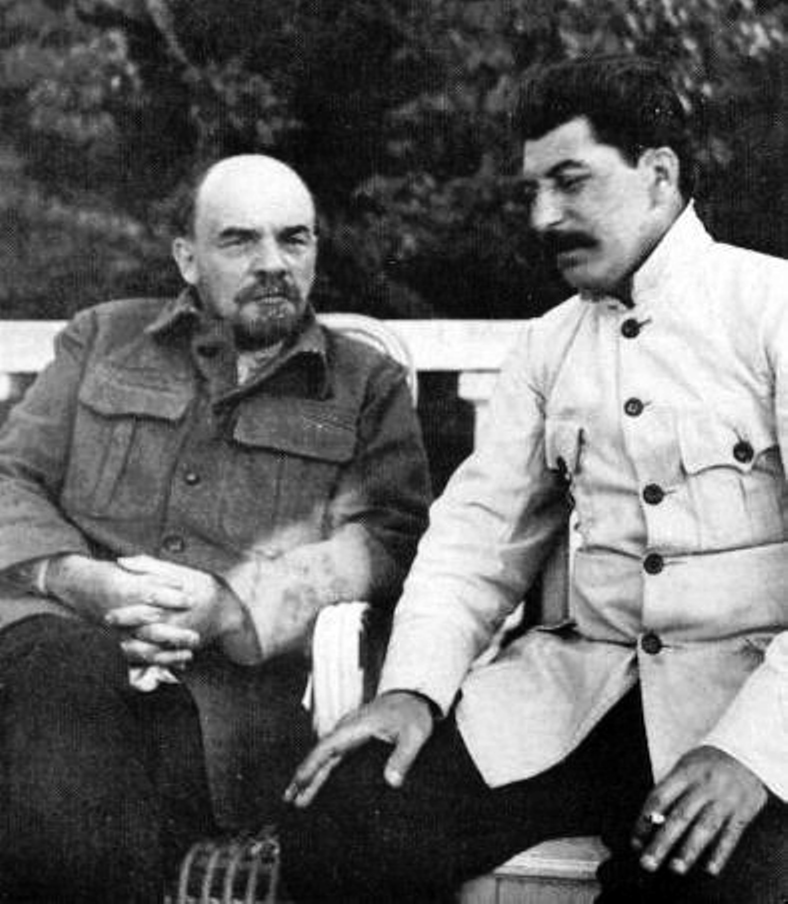 The name of the Soviet Union, its birth and development, have always
been connected with the names of V.I. Lenin and J.V. Stalin. The Great
October Revolution, which took place in 1917 under the leadership of V.I.
Lenin, created the conditions for the development of Soviet power, and
soon
afterwards the Soviet Union came into being. Socialism was constructed
in the Soviet Union and, besides other things, the country was
industrialized with unprecedented speed. Revolution unleashed the
productive forces which were either lying dormant, chained hand-and-foot
under the feudal rule of
the tsars, or were being squandered.
The name of the Soviet Union, its birth and development, have always
been connected with the names of V.I. Lenin and J.V. Stalin. The Great
October Revolution, which took place in 1917 under the leadership of V.I.
Lenin, created the conditions for the development of Soviet power, and
soon
afterwards the Soviet Union came into being. Socialism was constructed
in the Soviet Union and, besides other things, the country was
industrialized with unprecedented speed. Revolution unleashed the
productive forces which were either lying dormant, chained hand-and-foot
under the feudal rule of
the tsars, or were being squandered.
The Great October Revolution shook the old world and with the creation of the Soviet Union, a new world came into being. This is so despite the setbacks suffered when, after the death of J.V. Stalin, subsequent regimes failed to sort out the problems of socialist construction. Instead of socialist revolution and socialist construction, they systematically restored capitalism. The Soviet Union became a social-imperialist superpower which colluded and contended with U.S. imperialism for world hegemony, even though it concealed its imperialism under the slogans of socialism and proletarian internationalism.
On December 25, 1991, the tsarist flag minus the tsarist crown was again raised over the Kremlin, more than 70 years after it had been brought down. Nearly all of the main imperialist countries applauded this development, calling it a victory for freedom and democracy. They also hailed it as a great advance against totalitarianism, and said that a new world with no "Cold War" has been created.
Thus, the raising of the tsarist flag over the Kremlin marked the end
of pseudo-socialism, just as the coming to power of Nikita Khrushchev in 1958
spelled the end of socialist revolution and construction. It
signalled the victory of capitalism and imperialism over the cause of
revolution and
socialism.
Far from signalling the defeat of socialism, it raised once
again the necessity for socialism which is an historical inevitability.
The USSR gave humanity such concepts as freedom from exploiters, universal and free education and health care, friendship and and the brotherhood of nations. Socialism proved its vitality in the face of the intervention of 14 states that tried without success to smash Soviet Russia following the victory of the Great October Revolution, and proved it again some two decades later in the fight against Nazi-fascism and Japanese militarism. The USSR made a colossal leap forward in the industrialization of the country and the development of agriculture, social progress and the rights of its citizens as well as development of arts and culture and in the fields of science and technology, including the first flight into space. It also provided invaluable support to the national liberation struggles against the former colonial powers.
On this 100th anniversary of the creation of the Soviet Union, the Communist Party of Canada (Marxist-Leninist) hails the Great October Socialist Revolution and the Soviet power which the USSR constituted. They became events of such colossal historic significance that to date passions flare either in their favour or against them. Despite all efforts of the imperialists to denigrate and eradicate these achievements, they cannot be denied.
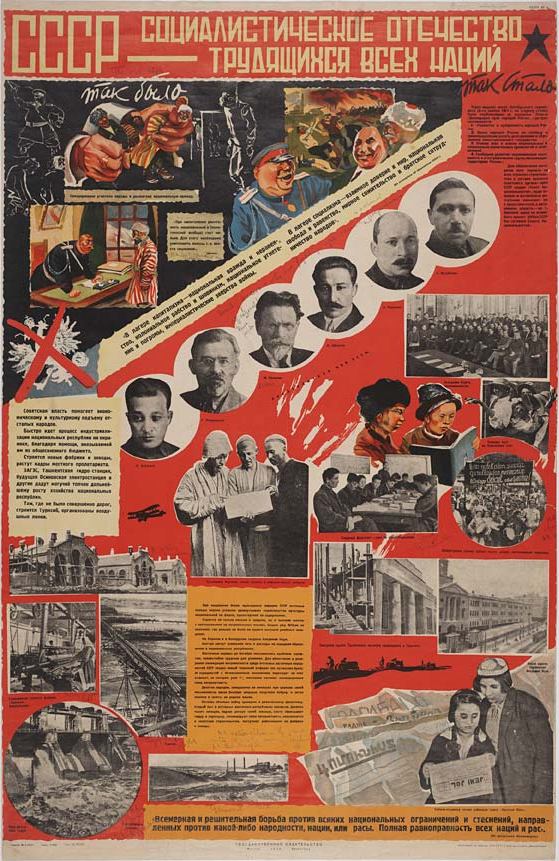
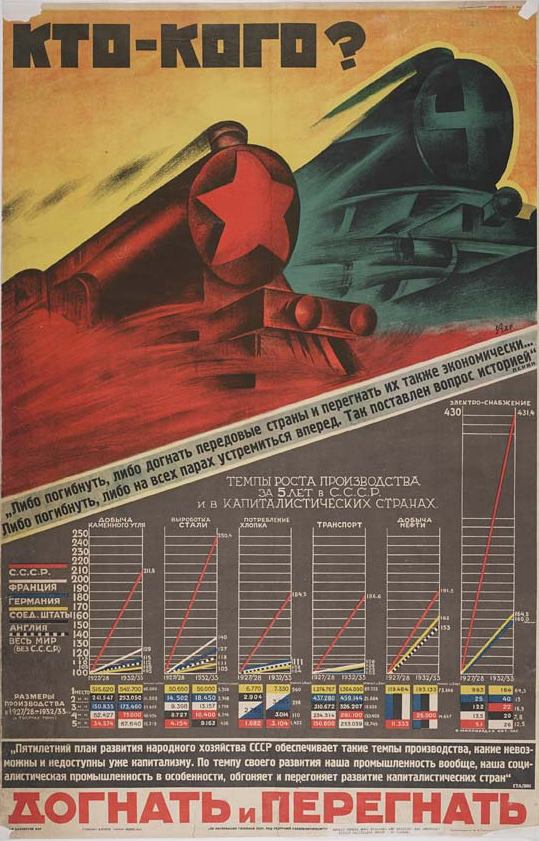
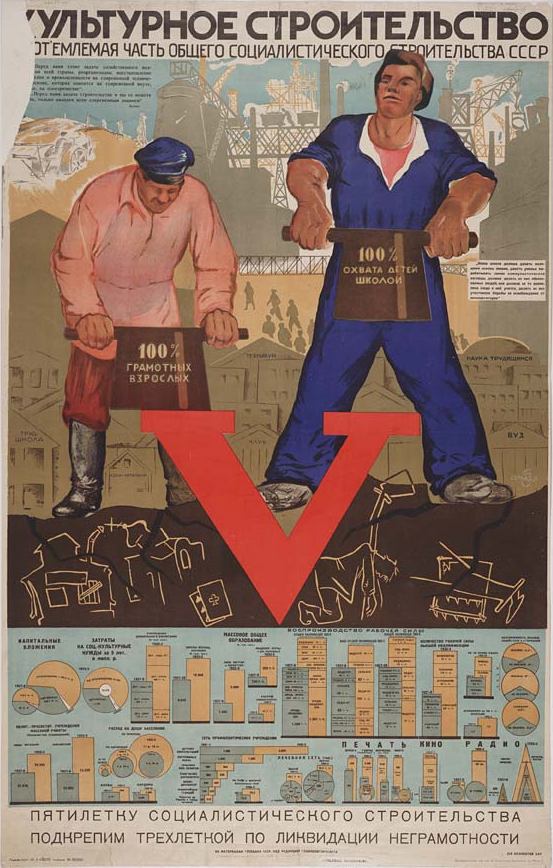
Posters showing socialist construction in the USSR in the 1920s. Left to
right: "The USSR is the socialist homeland of all nations"; "Who will
beat whom?" Soviet plans to overtake the main capitalist states in
various branches of industry; "Cultural construction is an integral part
of the general socialist construction of the USSR." Click to enlarge.
The Formation of the Union of the Soviet Republics
Comrades, this day marks a turning point in the history of the Soviet power. It places a landmark between the old period, now past, when the Soviet republics, although they acted in common, yet each followed its own path and was concerned primarily with its own preservation, and the new period, already begun, when an end is being put to the isolated existence of the Soviet republics, when the republics are being united into a single union state for a successful struggle against economic ruin, and when the Soviet power is concerned not only with its preservation, but with developing into an important international force, capable of influencing the international situation and of modifying it in the interests of the working people.
What was the Soviet state five years ago? A small, scarcely
noticeable entity, which evoked the derision of all its enemies and the
pity of many of its friends. That was the period of wartime ruin, when
the Soviet power relied not so much upon its own strength as upon the
impotence of its
opponents; when the enemies of the Soviet power, split into two
coalitions, the Austro-German coalition and the Anglo-French coalition,
were engaged in mutual warfare and were not in a position to turn their
weapons against the Soviet power. In the history of the Soviet power
that was the period of
wartime ruin. In the struggle against Kolchak and Denikin, however, the
Soviet power created the Red Army and successfully emerged from the
period of wartime ruin.
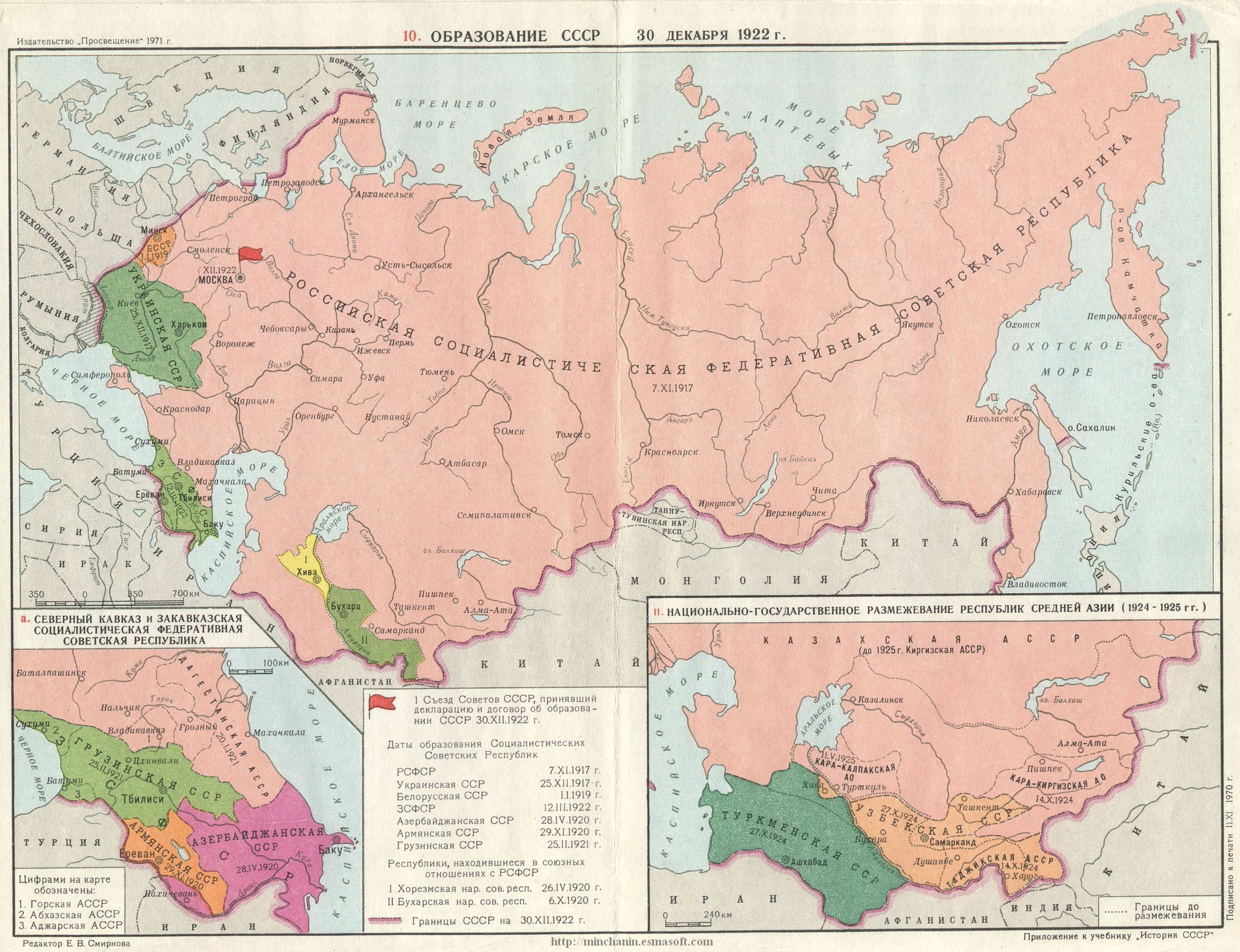 Map
of the USSR in 1922, made up at that time of the Russian Soviet
Federative Socialist Republic, the Ukrainian Soviet Socialist Republic,
the Transcaucasian Socialist Federative Soviet Republic and the
Byelorussian Soviet Socialist Republic. Click to enlarge.
Map
of the USSR in 1922, made up at that time of the Russian Soviet
Federative Socialist Republic, the Ukrainian Soviet Socialist Republic,
the Transcaucasian Socialist Federative Soviet Republic and the
Byelorussian Soviet Socialist Republic. Click to enlarge.
Later, the second period in the history of the Soviet power began, the period of struggle against economic ruin. This period is by no means over yet, but it has already borne fruit, for during this period the Soviet power has successfully coped with the famine which afflicted the country last year. During this period we have witnessed a considerable advance in agriculture and a considerable revival of the light industries. Cadres of industrial leaders have already come to the fore and are the object of our hope and trust. But that is far from enough for the purpose of overcoming economic ruin. To vanquish and eliminate that ruin, the forces of all the Soviet republics must be pooled; all the financial and economic potentialities of the republics must be concentrated on the task of restoring our basic industries. Hence the necessity for uniting the Soviet republics into a single union state. Today is the day of the union of our republics into a single state for the purpose of pooling all our forces for the restoration of our economy.
The period of combating wartime ruin gave us the Red Army, one of the foundations of the existence of the Soviet power. The next period, the period of struggle against economic ruin, is giving us a new framework of state existence -- the Union of Soviet Socialist Republics, which will undoubtedly promote the work of restoring Soviet economy.
What is the Soviet power now? A great state of the working people which evokes among our enemies not derision but the gnashing of teeth.
Such are the results of the development of the Soviet power during the five years of its existence.
But, comrades, today is not only a day for summing up, it is at the same time the day of triumph of the new Russia over the old Russia, the Russia that was the gendarme of Europe, the Russia that was the hangman of Asia. Today is the day of triumph of the new Russia, which has smashed the chains of national oppression, organized victory over capital, created the dictatorship of the proletariat, awakened the peoples of the East, inspires the workers of the West, transformed the Red Flag from a Party banner into a State banner, and rallied around that banner the peoples of the Soviet republics in order to unite them into a single state, the Union of Soviet Socialist Republics, the prototype of the future World Soviet Socialist Republic.
We Communists are often abused and accused of being unable to build. Let the history of the Soviet power during these five years of its existence serve as proof that Communists are also able to build. Let today's Congress of Soviets, whose function it is to ratify the Declaration and Treaty of Union of the Republics that were adopted at the Conference of Plenipotentiary Delegations yesterday, let this Union Congress demonstrate to all who have not yet lost the ability to understand, that Communists are as well able to build the New as they are to destroy the old.
Here, comrades, is the Declaration that was adopted yesterday, at the Conference of Plenipotentiary Delegations.2 I shall read it.
And here is the text of the Treaty that was adopted at the same conference. I shall read it.
Comrades, on the instructions of the Conference of Plenipotentiary Delegations of the Soviet Republics I move that you ratify the texts I have just read of the Declaration and Treaty on the Formation of the Union of Soviet Socialist Republics.
Comrades, I propose that you adopt them with the unanimity characteristic of Communists, and thereby add a new chapter to the history of mankind. (Applause.)
Notes
1. The First Congress of Soviets of the USSR took place in Moscow on December 30, 1922. There were present 1,727 delegates from the Russian Soviet Federative Socialist Republic (RSFSR), 364 from the Ukrainian SSR, 91 from the Transcaucasian Federation and 33 from the Byelorussian SSR. The congress discussed J.V. Stalin's report on the formation of the Union of Soviet Socialist Republics, it ratified the Declaration and the Treaty of Union on the Formation of the USSR, and elected the Central Executive Committee of the USSR.
2. The Conference of plenipotentiary Delegations of the RSFSR, the Ukrainian SSR, the Byelorussian SSR and of the Transcaucasian Socialist Federative Soviet Republic took place on December 29, 1922. The conference examined and adopted the Declaration and the Treaty on the Formation of the Union of Soviet Socialist Republics. J.V. Stalin made a report to the conference on the order of proceedings at the First Congress of Soviets of the USSR. The conference instructed J.V. Stalin to deliver at the congress the report on the formation of the USSR. In the morning of December 30, the plenipotentiary delegations signed the Declaration and the Treaty on the Formation of the USSR.
(Pravda, No. 298, December 31, 1922)
Greetings to the Land of Heroes!
The following greetings are from the All-Russian Public
Organization of Russian Socialist Scientists (RUSO), a non-governmental
organization of scientists and other citizens of the Russian Federation
that is active in the fields of science, culture, education, ethics and
social progress, for the revival and development of the country. To this
end it conducts scientific research, education and journalistic
activities.
Today, December 30, we celebrate the centenary of the foundation of the Union of Soviet Socialist Republics (USSR).
The victory of the Great October Socialist Revolution was the main precondition for the implementation of Lenin's idea of building socialism in one state. It was the realization of the dream of many generations of people around the world. The dream inspired philosophers and leaders of popular uprisings, rebels, scientists and writers. Like millions of dispossessed people, they dreamed of a society without enmity, without ethnic and religious conflicts, without hunger and poverty, without the division of the people into "excluded" and "chosen."
In December 1922, this dream found its practical embodiment in the creation of a single multinational, proletarian state -- the USSR. The USSR became a new historical type of society and state.
The formation of the Soviet Union was one of the decisive factors that created favourable conditions for the reorganization of society on socialist principles, for the economic and cultural recovery of all Soviet republics, for the strengthening of their power of defence and the international positions of the multinational workers' state. Under Lenin's leadership, socialism became not only a theory and a political trend, but also a social practice.
The greatest merit in the creation of the USSR belongs precisely to the leader of the Party, Vladimir Ilyich Lenin. On the basis of a thorough scientific analysis, Lenin showed that:
Without the closest union of the Soviet republics, it would have been impossible to defend their existence against world imperialism;
Without the union of the Soviet republics, without their close economic cooperation, it would have been impossible to restore the productive forces that had been destroyed by imperialism, to create a single socialist economy, governed by a common plan, to ensure a rational social division of labour and efficient use of natural resources for the good of all the peoples of the country;
Without the close union of the Soviet republics, it would have been impossible to ensure the steady growth of workers' welfare and the full development and flourishing of the culture of all nations and nationalities of the country.
This experience of the formation of a multinational state of a new type has shown that only the socialist revolution ensures the close union of all popular forces led by the working class with the aim of eliminating the system of capitalist exploitation and, with it, the system of national oppression. The decisive political condition for the fulfillment of this historical task is the establishment of the dictatorship of the proletariat, and the main economic condition is the establishment of public ownership of the means of production.
The decision to form a union was taken by the Congresses of Soviets of all republics. On December 30, 1922, the First Congress of the All-Union Congress of Soviets unanimously adopted a declaration presented by Stalin on the formation of the USSR. He expressed his firm belief that the new state of the Union would be a worthy culmination of the foundations, laid in October 1917, of peaceful coexistence and fraternal cooperation between peoples.
The Great Patriotic War was a severe test of the strength of the USSR. The confrontation with Hitler's fascism, the most dangerous enemy of mankind, clearly demonstrated that the Soviet peoples could defend their freedom and independence and their revolutionary achievements only in a union and by joining forces.
The military-political and economic power of the USSR in the post-war period prevented the threat of a nuclear war by the resurgent American fascism that sought to dominate the world. The Soviet Union became the centre of a world system of socialist development and support for countries freed from colonial rule.
This is the historical truth. It must be known, understood and passed on to the young generations who grew up after the destruction of the USSR in conditions of media distortion of its history.
Celebrating the 100th anniversary of the Soviet Union, we look with legitimate pride at the path of heroic victories and achievements, great achievements. Thanks to years of experience, we are convinced today of the rich fruits that the cohesion of the peoples of the USSR has given and the vast possibilities it can open up in our inevitable socialist future.
The fantastic rise of Soviet power in its first two five-year periods
placed it first in Europe and second in the world in terms of total
production, achieving leadership in the production of many of the most
important industrial products. The astonished world called this the
"Soviet miracle." In the first five-year period alone, more than 1,500
industrial enterprises were built. Among them were the V.I. Lenin
Dneproges hydroelectric plant, which produced more energy than all the
power plants of tsarist Russia, the Ural-Kuznetsk Metallurgical Combine
project, the Stalingrad and Kharkov tractor plants, the Rostselmash
agricultural equipment plant, the Moscow and Gorky automobile plants, as
well as the completion of the construction of the Turkestan-Siberian
railway. Heavy industry in the USSR almost tripled during this period,
while production of machinery increased fourfold. The rate of average
annual growth of industrial production was 15 per cent.
The USSR created the material and spiritual conditions for the growth of the creative potential of each Soviet and the full development of their personalities.
The formation and successful development of the USSR was and is of considerable international importance, a milestone in the social progress of all mankind. The Soviet experience of creating a multinational socialist state, building a socialist society through the joint efforts of our peoples, solving the complex national question has gained worldwide recognition and today provides invaluable help to all fighters for social and national liberation.
The destruction of the USSR at the end of 1991 had many causes, including the successful implementation of the "anti-Soviet project" developed in the "intellectual headquarters" of the U.S.-led system of world imperialism. Its main objective was to develop and improve the "strategy" of informational, psychological and values-based warfare against the main pillars of Soviet socialism. Above all, it targeted the moral and spiritual foundations of the Soviet person, by "inoculating" them with the "social viruses" of petty-bourgeois consciousness, egoism and the revival of private property instincts.
The tragic destruction of the USSR by the Gorbachev-Yeltsin gang in 1991 was a tragic event for the entire Soviet people. The rupture of the age-old ties between the peoples threw them under the influence of political scoundrels, nationalists of all kinds, Nazis and fascists, and into the abyss of inter-ethnic strife and bloody clashes. The bloodiest of all was the struggle against Ukrainian nationalism and Banderite fascism.
Today, the world imperialism of the West continues to wage an economic war against Russia in particular, and a hybrid war as a whole, including the aggressive campaign of Russophobia that has begun in Europe and the United States. In its falsity and its information and propaganda tools, it is comparable to Hitler's Russophobia during the Great Patriotic War.
The formation of the USSR in 1922 as a state union of peoples was an extraordinary phenomenon in world historical practice. Before the birth of the USSR, such large-scale voluntary alliances of nations and peoples into integral states had never been seen in the history of the world. The disappearance of the Soviet Union had disastrous consequences on a global scale. Above all, the balance of class forces on the international scene has been upset. The balance of global social development has been disturbed. A territorial redistribution of the globe has taken place. The threat of a universal catastrophe of nuclear annihilation of civilization has increased.
The peoples of the world are increasingly aware that there is no reasonable alternative to socialism and communism. It so happens that in this year of the centenary of the USSR, the indisputable fact that our country has been the most successful and victorious, the most just and the most attractive to others during the years of the creation of socialism has been particularly vividly highlighted. It is also an undeniable fact that we live in a country where the experience and ideas of socialism were deeply rooted, penetrated the living fabric of society and became part of every person, every family and the entire country.
On the occasion of this glorious jubilee, we socialist scientists remain faithful to the ideas of proletarian internationalism, friendship between peoples and strengthening the ties between the peoples of the Soviet republics. We consider it our main task to do everything possible to revive the USSR, our socialist motherland. Our slogan is: "Forward to the USSR!"
To all those who cherish the memory of our common home, the USSR, we say to the future of the Union:
In the daily grind of great construction sites,
In the joyful roar, in the lights and bells,
Hello, land of heroes,
Land of dreamers, land of scientists!
We have no obstacles, neither at sea nor on land,
No ice, no clouds, no ice, no clouds.
The flame of our souls, the banner of our country
We shall carry it through worlds and ages.
Happy Celebrations! Happy 100th Anniversary of the USSR!
Presidium of the Central Committee of the Organization of Russian Socialist Scientists
(kprf.ru)
Tributes in Russia to Founding of Soviet Union
On December 8 in Moscow, the Communist Party of the Russian Federation (KPRF) held a gala concert dedicated to the 100th anniversary of the USSR, in the Hall of Columns of the House of Unions. The event included an address by G.A. Zyuganov, Chairman of the Central Committee of the KPRF, and Head of the Communist Party faction in the State Duma.
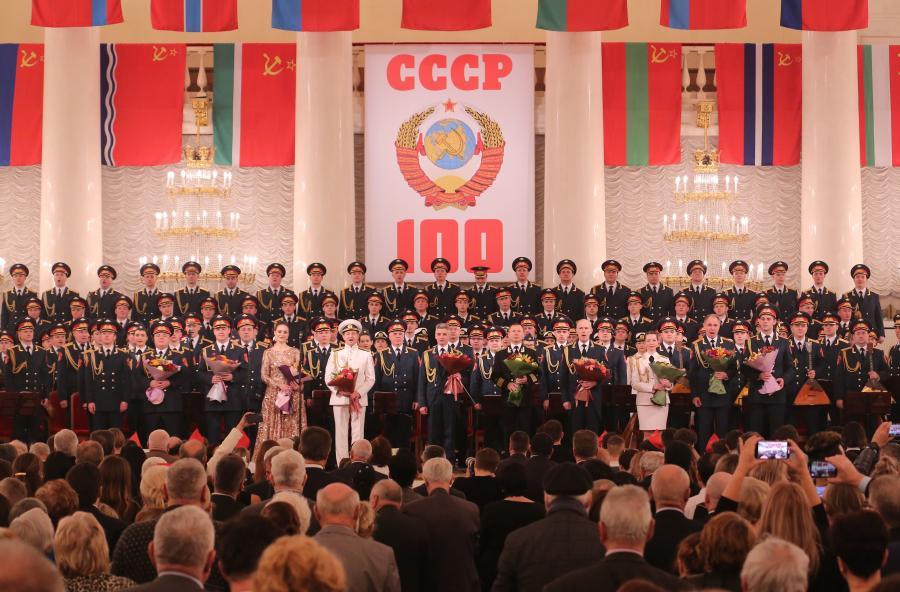
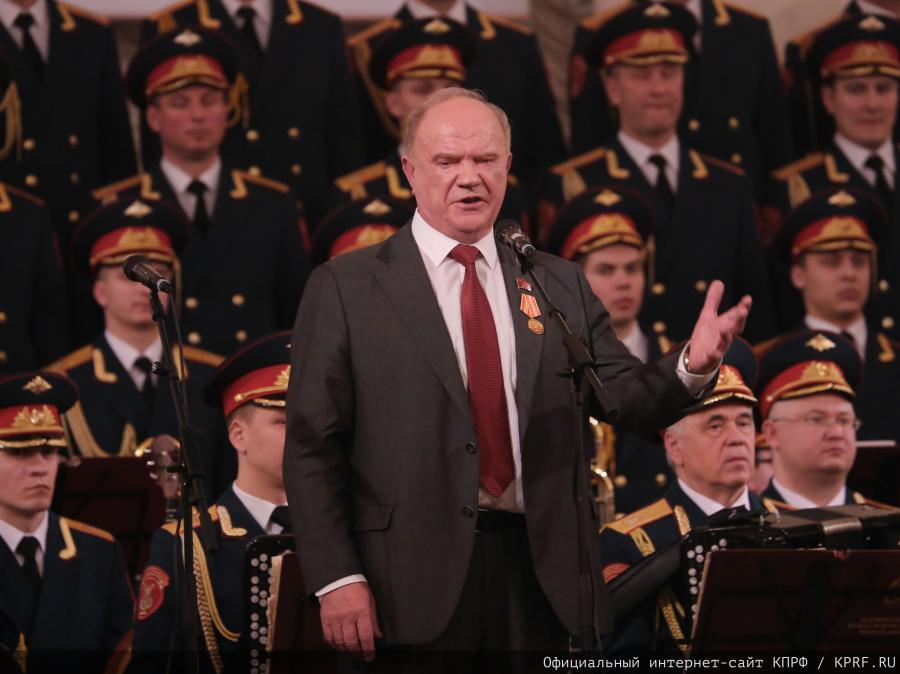
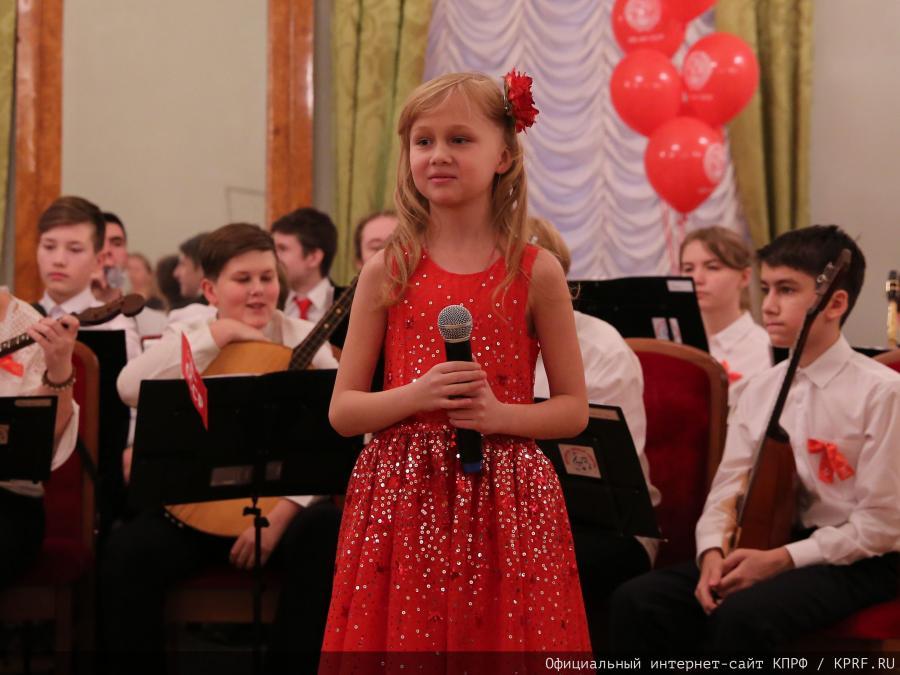
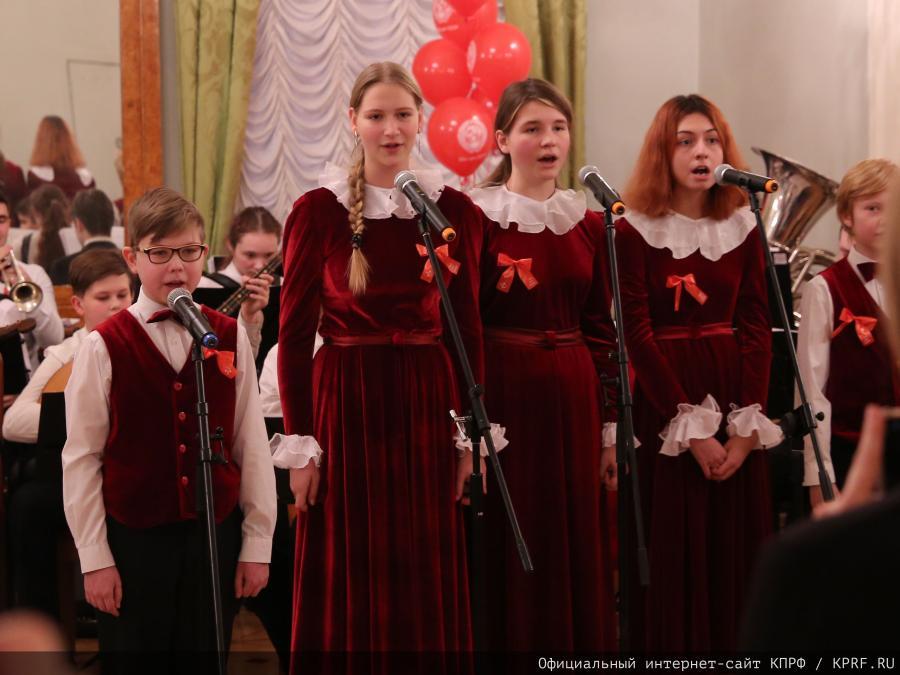
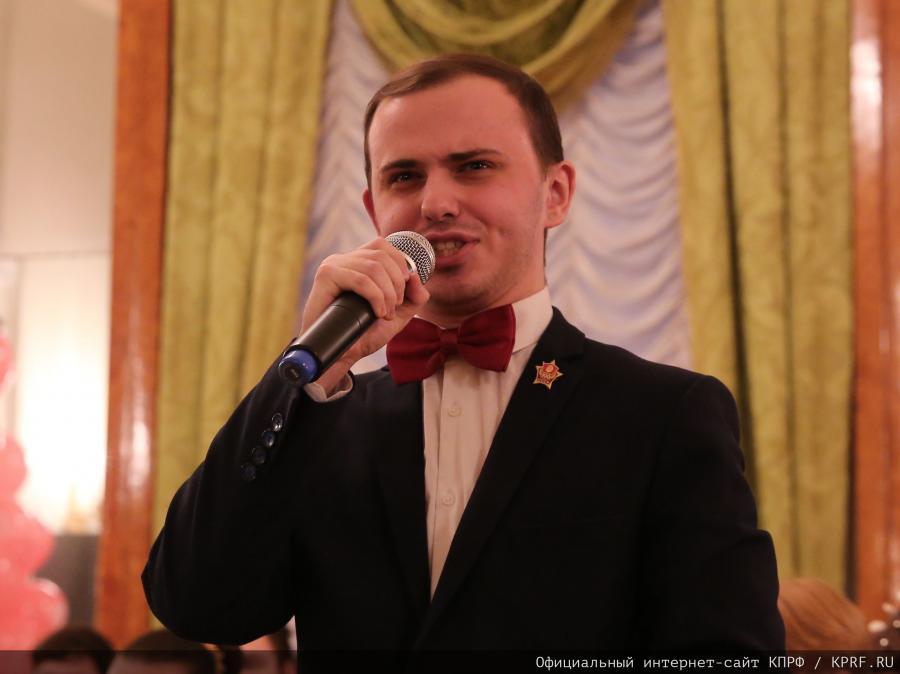
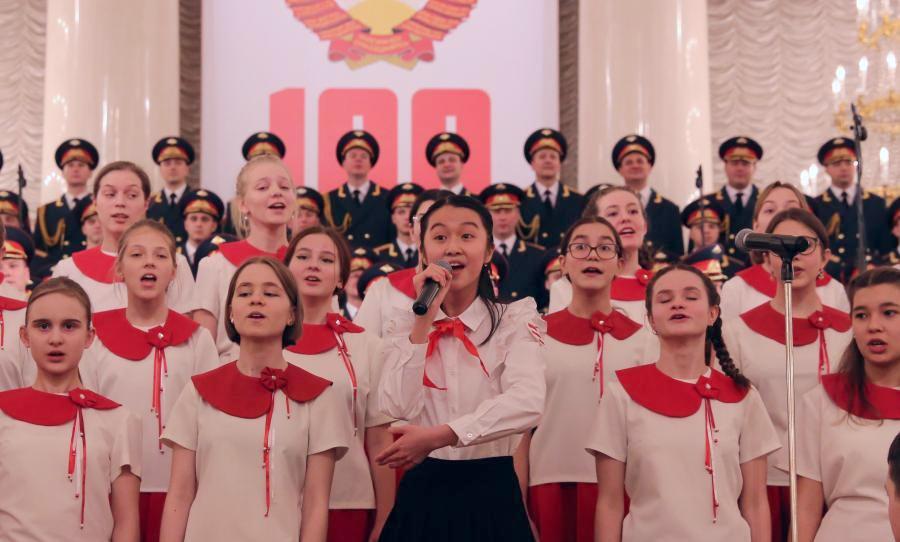
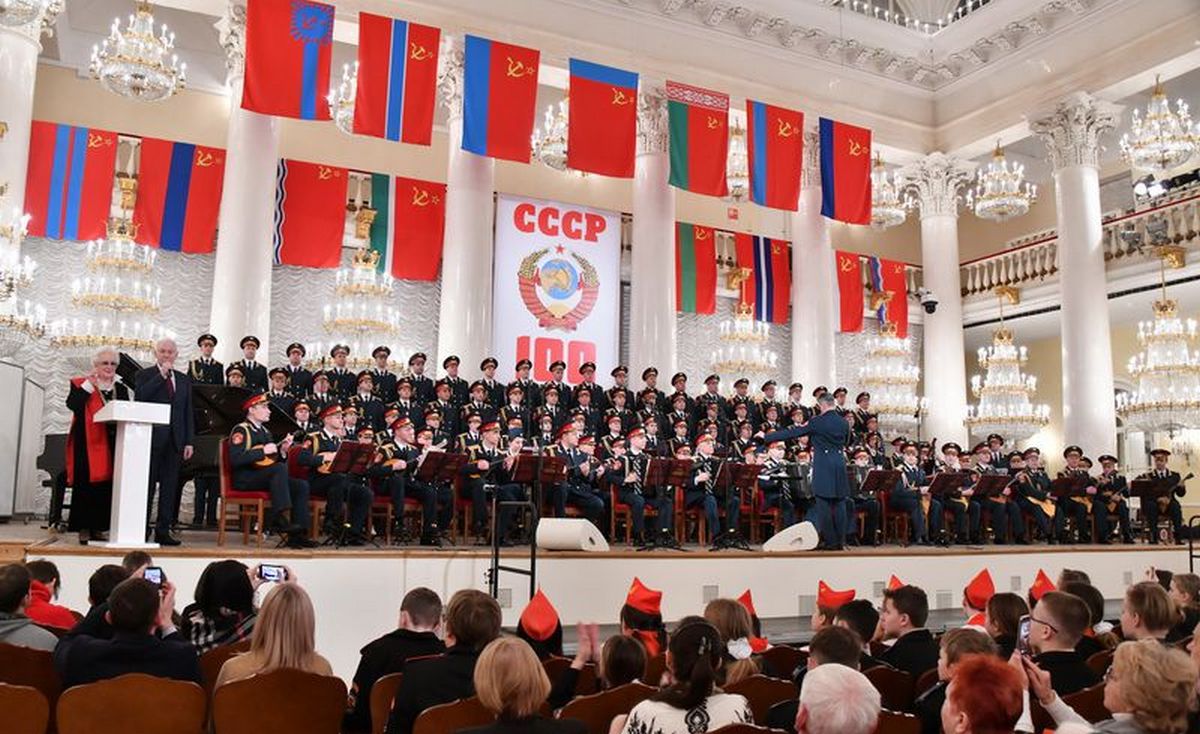
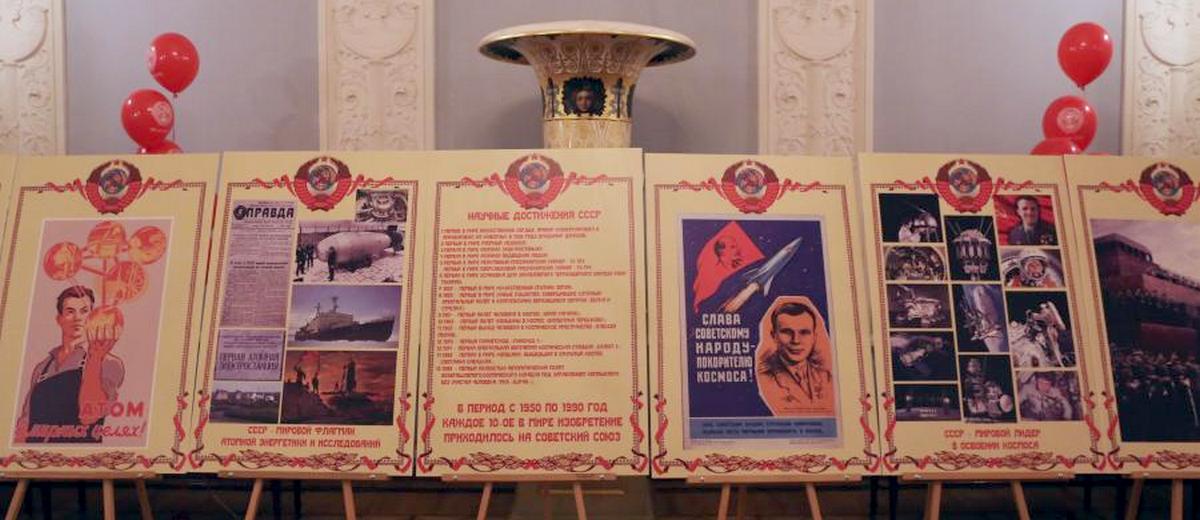
During December, the KPRF held several events where it presented commemorative medals to its members and supporters on the occasion of the 100th anniversary of the USSR.
Throughout December, KPRF members and supporters held car caravans, rallies and other outdoor events in various cities to pay tribute to the founding of the USSR.
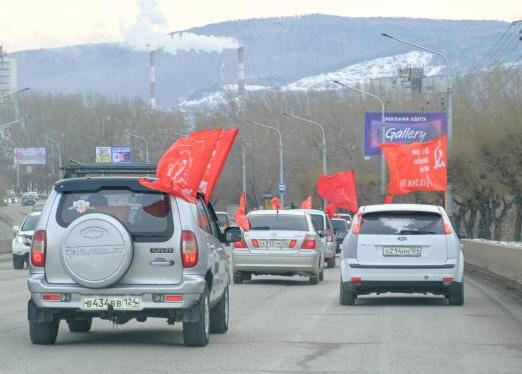
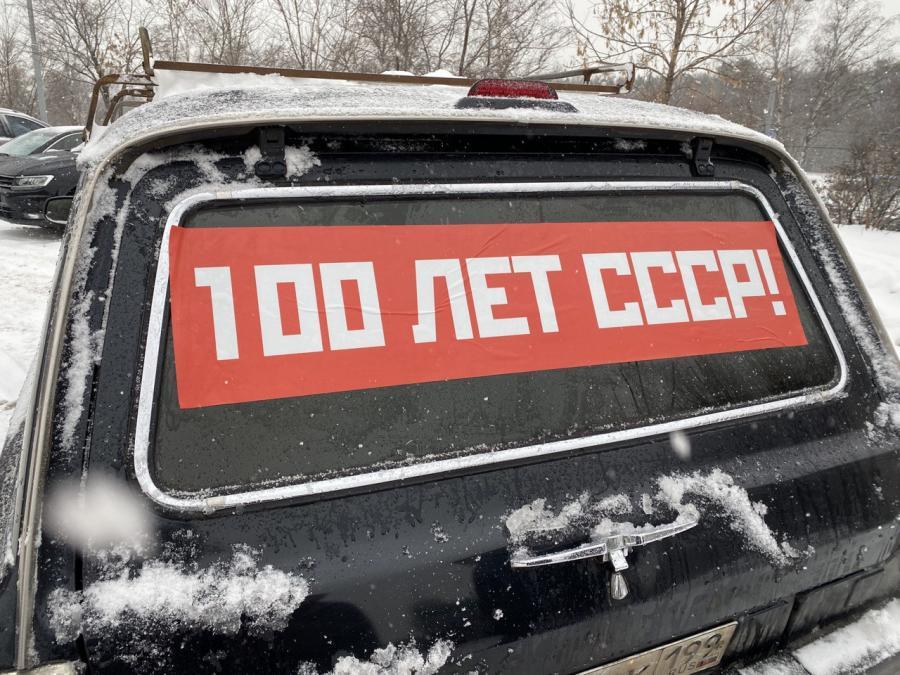
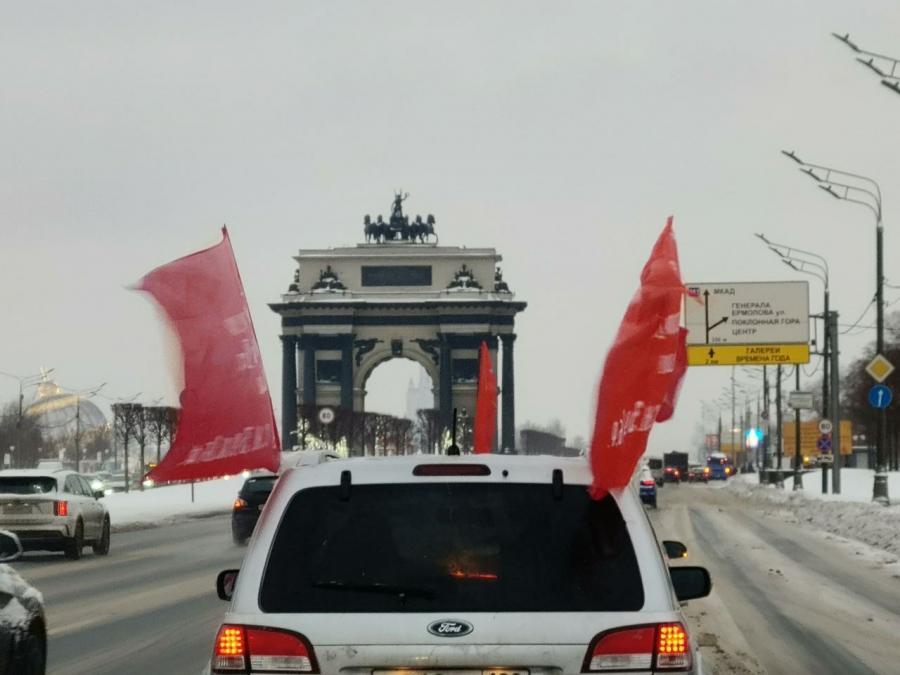
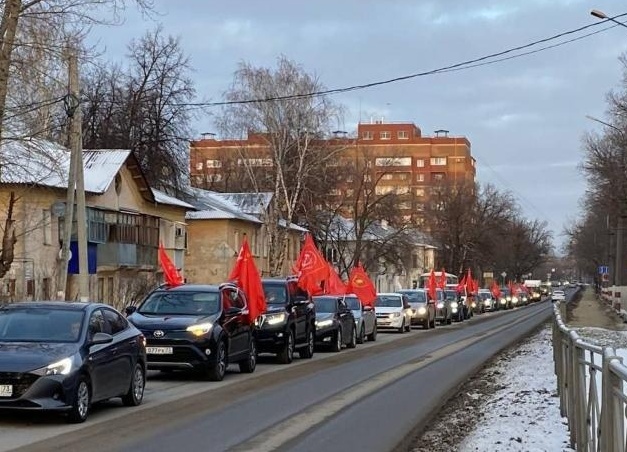
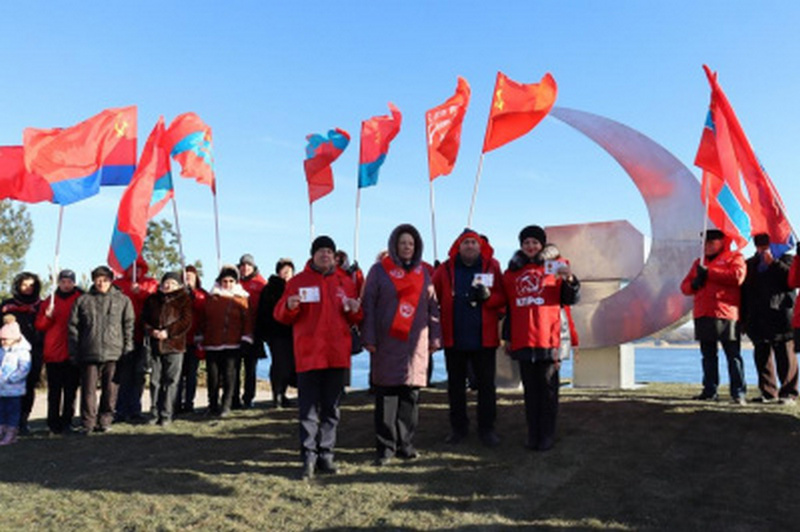
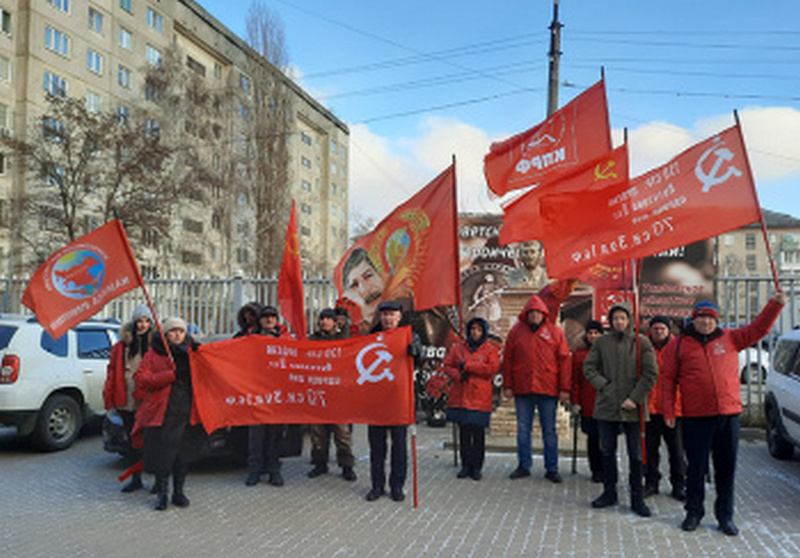
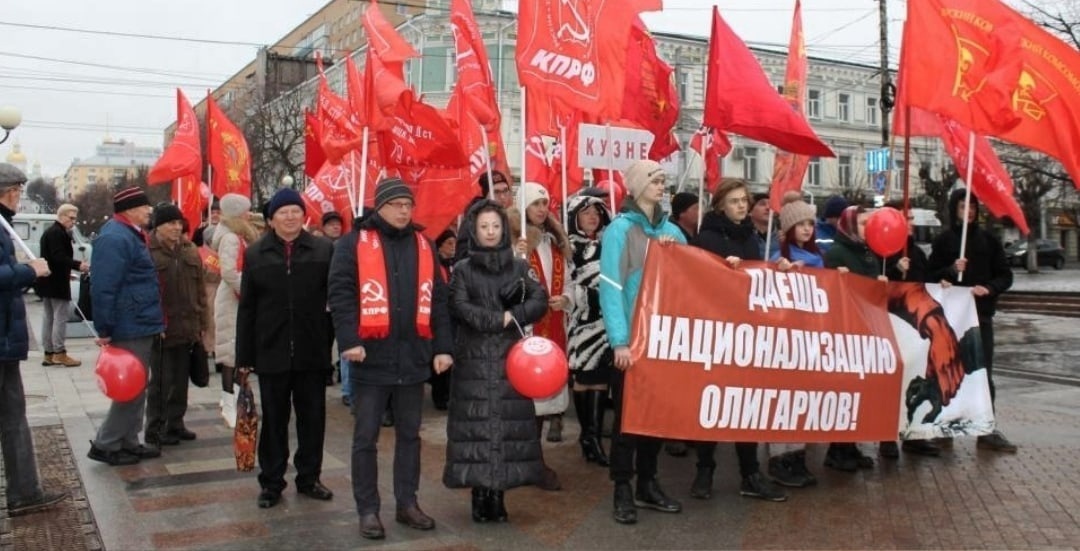
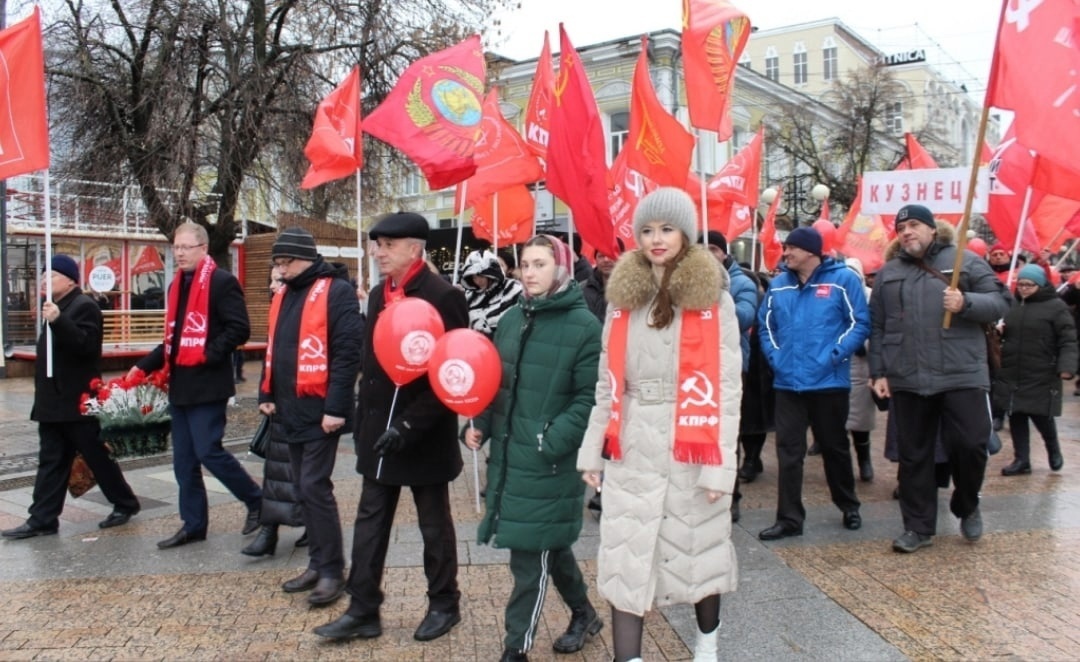
In Yekaterinburg in western Russia, roadside billboards announced the anniversary.
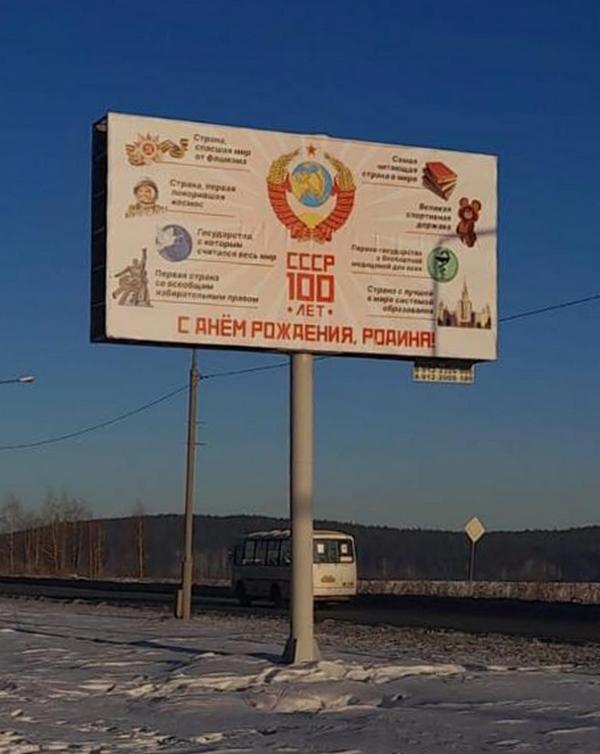
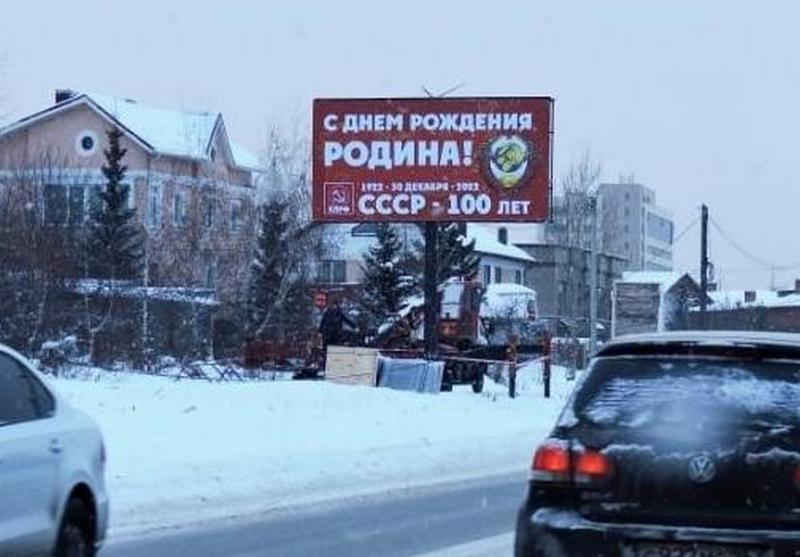
In Rostov-on-Don in southern Russia, the KPRF held a gala concert dedicated to the USSR's centenary on December 24. To watch the concert in full, click here.
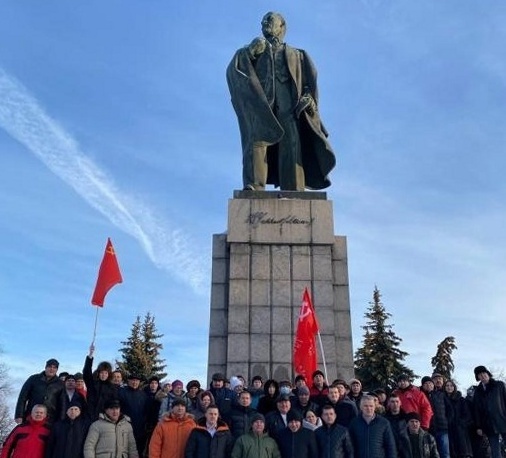 In Ulyanovsk in western Russia, local communists held a series of
events to mark the USSR's 100th anniversary on December 27. They
included the laying of flowers at the monument in Lenin Square, a car
caravan with the KPRF's flags, ending with a concert. Ulyanovsk is
located on the Volga River
and is the birthplace of V.I. Lenin.
In Ulyanovsk in western Russia, local communists held a series of
events to mark the USSR's 100th anniversary on December 27. They
included the laying of flowers at the monument in Lenin Square, a car
caravan with the KPRF's flags, ending with a concert. Ulyanovsk is
located on the Volga River
and is the birthplace of V.I. Lenin.
On December 29, in Abakan, the capital of Khakassia, a commemorative
concert was held, that included a performance of the Abakan Concert
Orchestra. Popular works by Soviet composers, including Khakassian
composers, as well as poems and songs from the war years were performed.
(Photos: KPRF)
Video
1922 -- The Birth of the New
Note to Readers
With this issue, TML Daily completes its publication for 2022. Your support of this work is greatly appreciated, and we encourage you to continue sending reports, articles, photos and views, as well as financial support in 2023.
The editorial and technical staff send their best wishes to you for the New Year.
(To access articles individually click on the black headline.)
Website: www.cpcml.ca Email: editor@cpcml.ca

